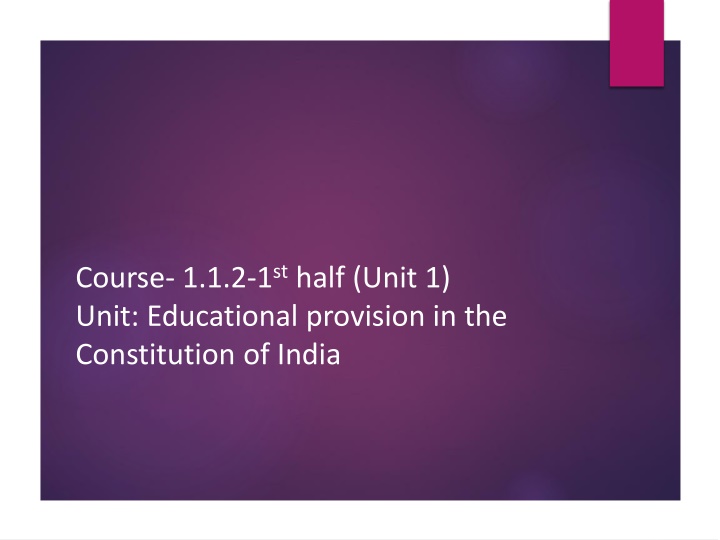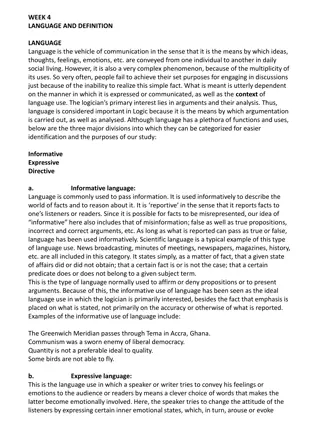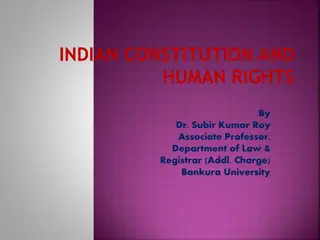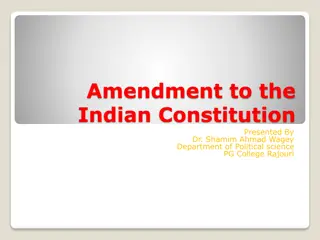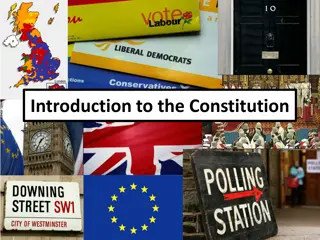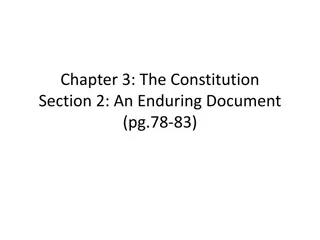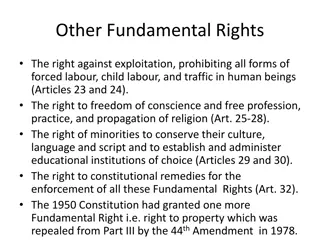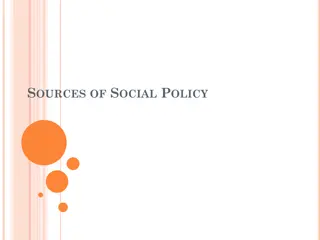Directive Principles of State Policy in the Indian Constitution
The Directive Principles of State Policy in the Indian Constitution provide guidelines for governance, focusing on social justice, economic welfare, and a just society. These principles are inspired by socialist ideology and aim at ensuring social and economic justice by minimizing inequalities, promoting welfare, equitable distribution of resources, and providing opportunities for all citizens.
Download Presentation

Please find below an Image/Link to download the presentation.
The content on the website is provided AS IS for your information and personal use only. It may not be sold, licensed, or shared on other websites without obtaining consent from the author.If you encounter any issues during the download, it is possible that the publisher has removed the file from their server.
You are allowed to download the files provided on this website for personal or commercial use, subject to the condition that they are used lawfully. All files are the property of their respective owners.
The content on the website is provided AS IS for your information and personal use only. It may not be sold, licensed, or shared on other websites without obtaining consent from the author.
E N D
Presentation Transcript
Course- 1.1.2-1sthalf (Unit 1) Unit: Educational provision in the Constitution of India
The Directive Principles of State Policy of India are the guidelines or 15 principles given to the federal institutes governing the State of India, to be kept in citation while framing laws and policies. These provisions, contained in Part IV of the Constitution of India, are not enforceable by any court, but the principles laid down there in are considered in the governance of the country, making it the duty of the State to apply these principles in making laws to establish a just society in the country. The principles have been inspired by the Directive Principles given in the Constitution of Ireland which are related to social justice, economic welfare, foreign policy, administrative matters. and legal and
Socialistic Principles These types of Directive principles of State Policy reflect the ideology of socialism They aim at providing social and economic justice, and set the path towards welfare state. Article 38 promote the welfare of the people by Securing a social order by justice- social, economic and political i. Minimizing inequalities in income, status, facilities and opportunities ii.
Socialistic Principles Article 39 secure i. Adequate means of livelihood for all citizen ii. Equitable distribution of resources for the common good iii. Prevention of concentration of wealth and means of production iv. Equal pay for equal work v. Preservation of the health and strength of workers and children against forcible abuse
Socialistic Principles Article 39A opportunities for securing justice is ensured to all, and is not denied by reason of economic or other disabilities. Article 41 The State shall provide free legal aid to ensure that equal education and to public assistance in cases of unemployment, old age, sickness and disablement, within the limits of economic capacity. Article 42 The State shall endeavour to provide the right to work, to and maternity relief. The State shall provide for just and humane conditions of work
Socialistic Principles Article 43 proper enjoyment of leisure and social and cultural activities. Also, the promotion of cottage industries in rural areas is one of the obligations of the State. Article 43A The State should also ensure living wage and working conditions for workers, with full participation in management of industrial undertakings. The State shall take steps to promote their
Socialistic Principles Article 47 the level of nutrition and the standard of living and to improve public health, particularly by prohibiting intoxicating drinks and drugs injurious to health except for medicinal purposes. The directive principles commit the State to raise
Gandhian Principles Definition: These principles are based on Gandhian ideology used to represent the programme of reconstruction enunciated by Gandhi during the national movement. Under various articles, they direct the state to:
Gandhian Principles Article 40 with necessary powers and authority to enable them to function as units of self-government Organise village panchayats and endow them Article 43 operation basis in rural areas Promote cottage industries on an individual or co-
Gandhian Principles Article 43B functioning, democratic control and professional management of co-operative societies Promote voluntary formation, autonomous Article 46 interests of SCs, STs, and other weaker sections of the society and to protect them from social injustice and exploitation Promote the educational and economic
Gandhian Principles Article 47 and drugs which are injurious to health Prohibit the consumption of intoxicating drinks Article 48 other milch and draught cattle and to improve their breeds Prohibit the slaughter of cows, calves and
Liberal-Intellectual Principles These principles reflect the ideology of liberalism. Under various articles, they direct the state to: Article 44 code throughout the country Secure for all citizens a uniform civil
Liberal-Intellectual Principles Article 45 for all children until they complete the age of six years. Provide early childhood care and education Article 48 modern and scientific lines Organise agriculture and animal husbandry on
Liberal-Intellectual Principles Article 48A to safeguard forests and wildlife To protect and improve the environment and Article 49 artistic or historic interest which are declared to be of national importance Protect monuments, places and objects of
Article 50 public services of the State Article 51 Promote international peace and security and maintain just and honourable relations between nations Foster respect for international law and treaty obligations Encourage settlement of international disputes by arbitration Separate the judiciary from the executive in the
